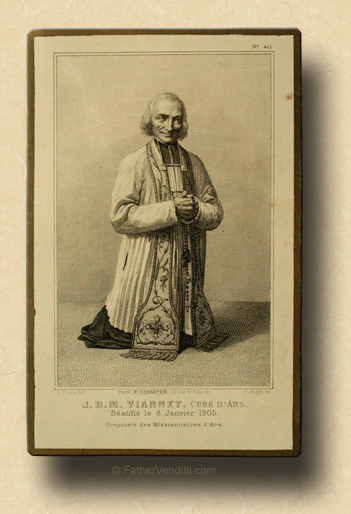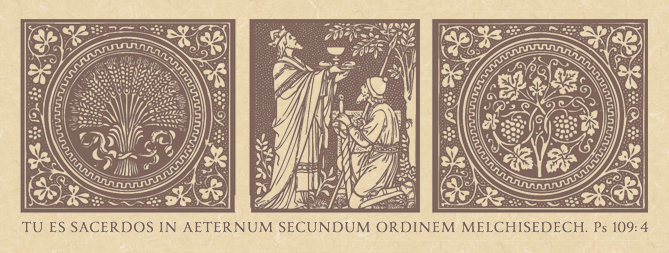Priests after the Heart of Jesus Christ.
The Memorial of Saint John Vianney, Priest.
Lessons from the primary feria, according to the ordinary form of the Roman Rite:
• Leviticus 23: 1, 4-11, 15-16, 27, 34-37.
• Psalm 81: 3-6, 10-11.
• Matthew 13: 54-58.
|
…or, from the proper:
• Ezekiel 3: 17-21.
• Psalm 117: 1-2.
• Matthew 9: 35—10: 1.
…or, any lessons from the common of Pastors for One Pastor.
|
The Third Class Feast of Saint Dominic, Confessor.*
First & second lessons from the proper, third from the common "Os justi…" of a Confessor not a Bishop, according to the extraordinary form of the Roman Rite:
• II Timothy 4: 1-8.
• Psalm 91: 13-14.
• Luke 12: 35-40.
The Eighth Friday after Pentecost; the Feast of the Seven Holy Children of Ephesus; and, the Feast of the Holy Venerable Martyr Eudoxia.**
Lessons from the pentecostarion, according to the Ruthenian recension of the Byzantine Rite:
• I Corinthians 14: 26-40.
• Matthew 21: 12-14; 17-20.
FatherVenditti.com
|
 8:01 AM 8/4/2017 — As is our custom on the First Friday of the Month, we’ll expose the Blessed Sacrament after Holy Communion, pray the Litany of the Most Sacred Heart, I’ll return to the confessional for the benefit of anyone who still wants to confess, and we’ll end with Benediction at 1:30. 8:01 AM 8/4/2017 — As is our custom on the First Friday of the Month, we’ll expose the Blessed Sacrament after Holy Communion, pray the Litany of the Most Sacred Heart, I’ll return to the confessional for the benefit of anyone who still wants to confess, and we’ll end with Benediction at 1:30.
Last year, just after Christmas, we had read Saint Luke’s much more detailed account of Our Lord’s visit home to preach in His home town synagogue in Galilee, what led up to that visit home, and how significant it was. Luke tells us all sorts of details, such as the Scripture passage that was read, and the content of Our Lord’s sermon there. From there we discussed the history of the synagogue service, and how it influenced the development of the Order of Holy Mass in the early Church, and reflected on the importance of being faithful to liturgical directives of the Church based on Our Lord’s own behavior toward the service of His day.
Saint Matthew’s brief account, which we read today, doesn’t included any of that, but focuses our attention only on the doubts expressed by those who heard Our Lord preach there. It’s paired with God’s instructions to Moses Leviticus about the feasts and festivals that Jewish people are to observe, so the liturgy is still very much part of the theme of today’s Scripture lessons.
 But in addition to being First Friday, today is also the Memorial of Saint John Vianney, the patron saint of parish priests; and, even though it’s purely by chance, we can’t ignore the happy coincidence that gives us this Gospel passage to read on his feast day. Our Lord’s congregation in Galilee marveled at the unassuming wisdom of His preaching because of the simplicity of His origins. They knew Him, and didn’t know Him to be anything special. In much the same way, the Curé d’Ars was often misunderstood in exactly the same way. Everyone who’s ever written a biography of him has weighed in on why people would come from miles away to visit his small parish in the middle of no where: his reputation for austere living, the hours he spent in the confessional, the rumors of his private battles with Satan, the simplicity of his preaching. He wasn’t a great preacher, and many of his sermons were read out of books; in fact, he struggled with his studies in the seminary, and had his ordination delayed for a while because they were concerned that he just wasn’t smart enough. But he wasn’t as simple a soul as most people thought; he was simply convinced of the simplicity of the Gospel, and preached a Christ Who was always the same. He never saw the need to continually make everything appear new and exciting, an annoying habit which has infected the Church of late. But in addition to being First Friday, today is also the Memorial of Saint John Vianney, the patron saint of parish priests; and, even though it’s purely by chance, we can’t ignore the happy coincidence that gives us this Gospel passage to read on his feast day. Our Lord’s congregation in Galilee marveled at the unassuming wisdom of His preaching because of the simplicity of His origins. They knew Him, and didn’t know Him to be anything special. In much the same way, the Curé d’Ars was often misunderstood in exactly the same way. Everyone who’s ever written a biography of him has weighed in on why people would come from miles away to visit his small parish in the middle of no where: his reputation for austere living, the hours he spent in the confessional, the rumors of his private battles with Satan, the simplicity of his preaching. He wasn’t a great preacher, and many of his sermons were read out of books; in fact, he struggled with his studies in the seminary, and had his ordination delayed for a while because they were concerned that he just wasn’t smart enough. But he wasn’t as simple a soul as most people thought; he was simply convinced of the simplicity of the Gospel, and preached a Christ Who was always the same. He never saw the need to continually make everything appear new and exciting, an annoying habit which has infected the Church of late.
You’ve noticed how we have started reciting a prayer for priests after Mass each week day. That prayer is never more appropriate than today on John Vianney’s feast, and on this day on which we also honor Our Lord’s Most Sacred Heart. During this Mass, and during our Holy Hour, let’s remember our priests, and ask Our Lord to help every priest be, like Saint John Vianney, a priest after the Heart of Jesus Christ.

* The founder of the Order of Preachers was born Dominic Guzman in Spain. He opposed the errors of the Albigenses, contributed to devotion to the Holy Rosary, saving the Western Church from heresy and anarchy, dying in 1221.
** The Seven Holy Children, all blood brothers, were sealed alive in a cave as punishment for their faith by the Emperor Decius c. 250. An ancient legend claims that, after three hundred years, they came out alive; however, note that this same story is told in the Quran regarding three Muslim brothers.
Eudoxia (or Eudocia), a nun, lived under Emperor Trajan (98-117), and was martyred at Heliopolis in Lebanon.
|

